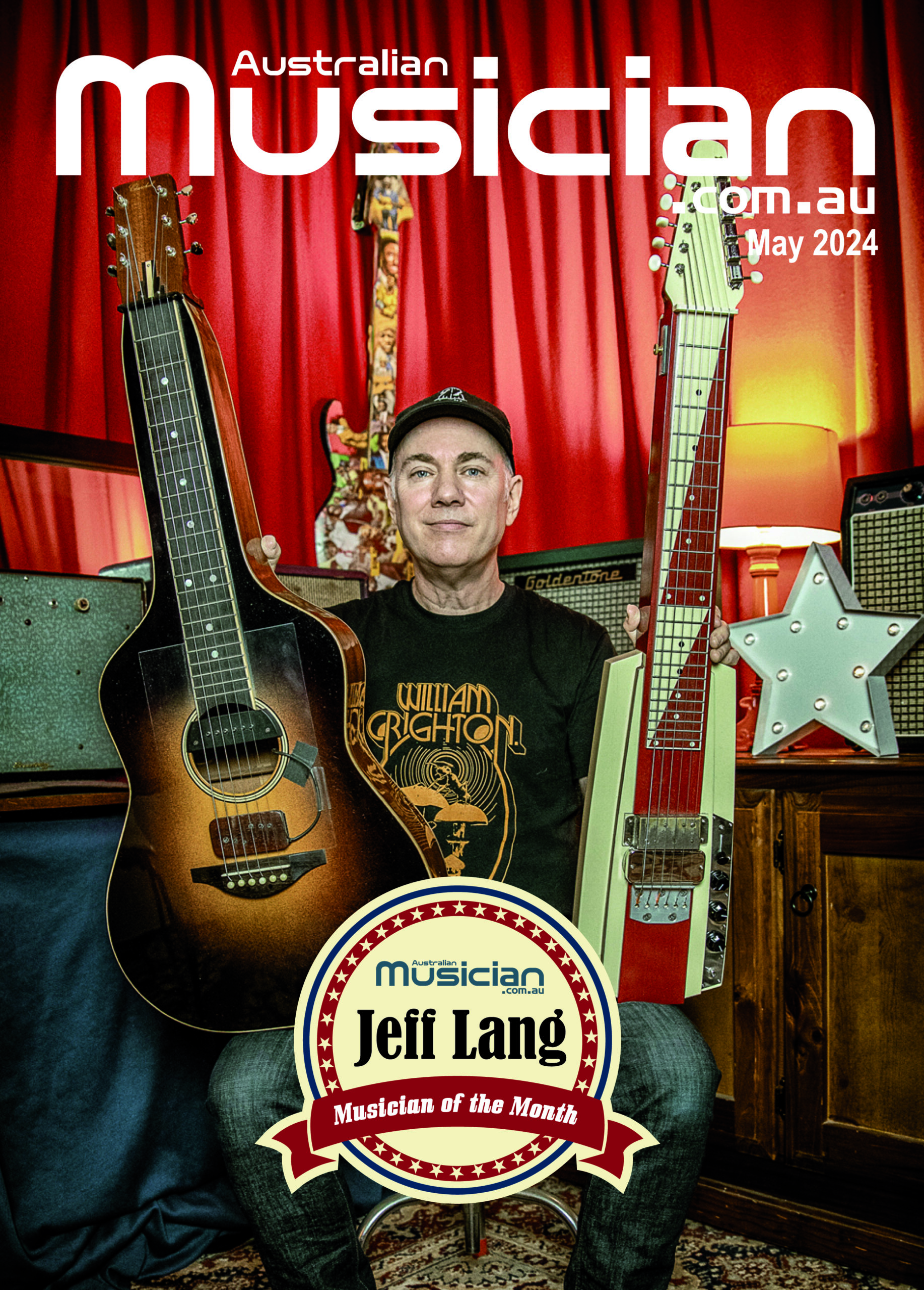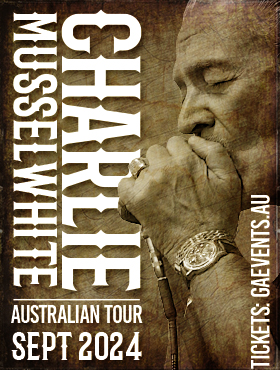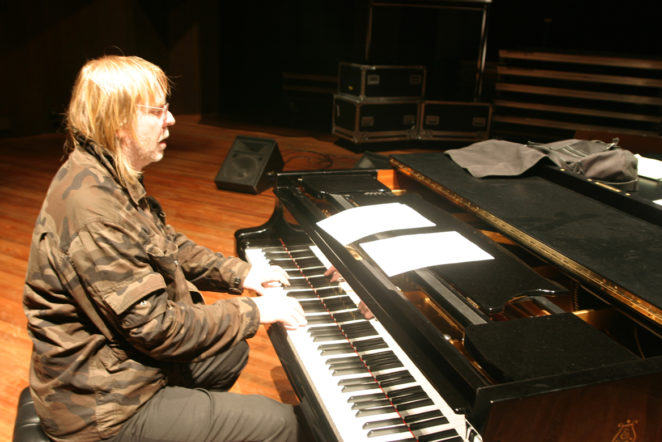
RICK WAKEMAN-SOUNDCHECKIN’ SOLO
January 10, 2006 | Author: Greg Phillips. Photos: Marty Williams
Master keyboard player Rick Wakeman is truly a rock music pioneer. His piano work can be heard on classic albums by David Bowie, T Rex and Black Sabbath as well as with his own classic progressive rock band Yes, and of course his legendary solo recordings. Rick was recently in Australia playing solo shows with a little assistance from his longtime vocalist mate, Ashley Holt. Half of the show was taken up by Rick’s amazing and often hilarious stories of life on the road as a professional musician. More than anything however, the concerts highlighted just what an amazingly skillful pianist Wakeman is. Rick announced the tour to be his last as a solo act. Australian Musician’s Greg Phillips sat down with him at sound check to discuss his past, present and future.
GP: Can we go back a bit?
RW: If the alzheimers doesn’t kick in too much!
GP: The band Yes was responsible for many innovations in rock.. (Rick laughs anticipating what I’m about to say) A lot of kids today aren’t aware that Yes was the first band to use laser lighting, playing ‘in the round’, even the way you stacked your keyboards was an innovation. What are you most proud of creating with the band Yes?
RW:In fairness it is true that we were the first to use a lot of things and for what its worth, I was the first person to stack keyboards on top of each other. I went to companies asking them to make me a keybaord stand and they laughed at me. The only way I could do it was to buy a chest of drawers from a furniture shop, take the drawers out, cut the sides off and put the keyboards on there. Everybody said you’re nuts. About 2 years ago in England they were doing a review of prog rock and they said for all the innovations of Mr Wakeman, what he’ll most be remembered for is when you walk into a pub and see an ageing old man of 85 sitting at a piano with two keyboards stacked on top… that’s his fault. I thought I’m going to be remembered for stacking keyboards on top of one another.
At the time though you don’t think of things as innovations, it’s just that you want to do something and it’s there. It’s only afterwards that if other people start doing it, then it becomes an innovation. But Yes attracted inventors, people that had nutty ideas that if they took them to normal people or normal bands, they’d be asked to go away. But we’d be like.. that’s great! We had lots of things on stage that we tried. We were the first to do back projection. To be honest when we did it first, it didn’t really work. While back projection was possible, having the right type of screen so it could be seen in all different kinds of light, wasn’t available. It was very hit and miss but we went ahead and did it anyway. We were very much of the principal that it might not be the finished article, but we can have a go at this.
GP: Were you aware of what other bands were doing back in the day? Was there a sense of competition?
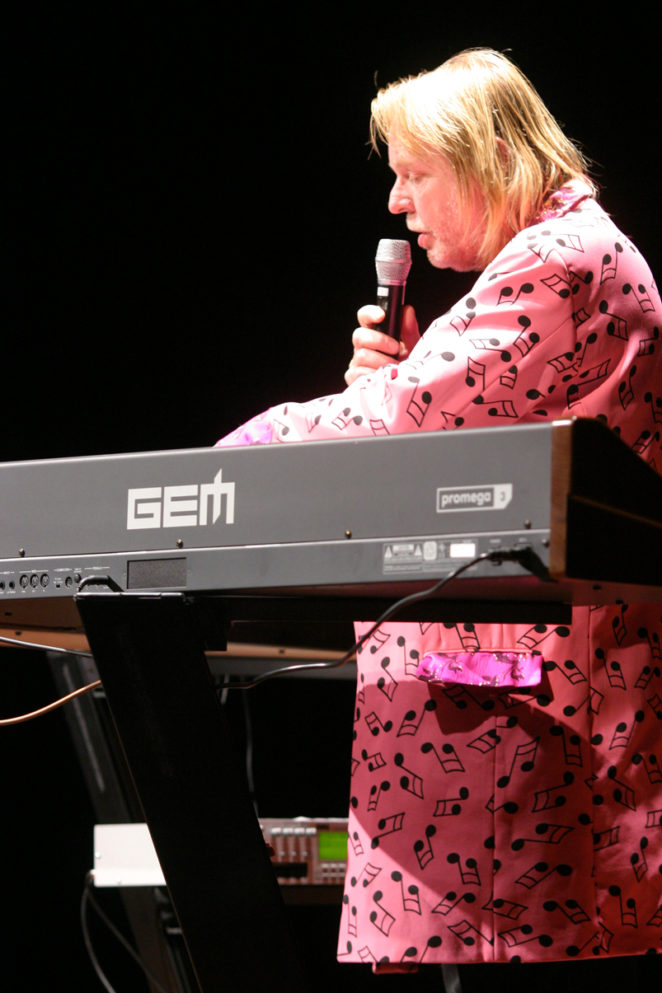 RW: Funnily enough there wasn’t. You were aware of what other bands were doing, but you applauded it. It was like a bunch of mad professors. We would call each other up, people in Genesis, Zeppelin. If they were going to a venue and you were going on after them and hadn’t been there before, especially in America where we played in ice hockey stadiums, it was all trial and error. I remember with the English Rock Ensemble, we were the first band to go to Brazil. We were playing a 35,000 seater and we only had two plug points. It (the venue) was only used for daily things so we took power off the trolley bus lines outside and shut down the whole transport system. We had bands going on after and they’d want to know what they had to do to get power. There was a lot of help. It was very much adventuring but you weren’t aware of it at the time. We didn’t know how long it was going to last. When I was twenty three I’d be asked what are you going to be doing when you’re thirty three? No idea! Do you know what you are going to do when you’re 43? Well … we’re still here. What you gonna do when you’re 53? I decided not long ago that it’s a pointless question to ask me because the best way to describe it is… what I want on my tombstone is “I’m not finished yet!”.
RW: Funnily enough there wasn’t. You were aware of what other bands were doing, but you applauded it. It was like a bunch of mad professors. We would call each other up, people in Genesis, Zeppelin. If they were going to a venue and you were going on after them and hadn’t been there before, especially in America where we played in ice hockey stadiums, it was all trial and error. I remember with the English Rock Ensemble, we were the first band to go to Brazil. We were playing a 35,000 seater and we only had two plug points. It (the venue) was only used for daily things so we took power off the trolley bus lines outside and shut down the whole transport system. We had bands going on after and they’d want to know what they had to do to get power. There was a lot of help. It was very much adventuring but you weren’t aware of it at the time. We didn’t know how long it was going to last. When I was twenty three I’d be asked what are you going to be doing when you’re thirty three? No idea! Do you know what you are going to do when you’re 43? Well … we’re still here. What you gonna do when you’re 53? I decided not long ago that it’s a pointless question to ask me because the best way to describe it is… what I want on my tombstone is “I’m not finished yet!”.
GP: You have worked with some amazing people, for instance… David Bowie.
RW: I did ‘Space Oddity’ and the ‘Hunky Dory’ album.
GP: What sort of parameters did he give you to work within?
RW: With ‘Hunky Dory’ I had absolute freedom. He played me the pieces on a battered old 12 string guitar and said I want to play it exactly as you want and I’ll get the band to work around you. He wanted them as piano based pieces like ‘Changes’ and ‘Life on Mars’. So ‘Hunky Dory’ was an absolute gem to do. I learned more from David about studio and recording than anyone else I had ever worked with. He was the ultimate professional, right from the early days. One day he had a go at his band because they hadn’t learned one of the pieces, and he sent them all home. He screamed at them saying “if you don’t realise how valuable studio time is … this is the end of the assembly line … it’s not to be abused. One day you will hope you have the money for studio time. If you haven’t got it, you’ll remember the time you wasted it.” It’s so true. A lot of bands abuse studio time today and one day they will regret it when they haven’t got the budget. Then they’ll think about the day they said they’d prefer to go skiing instead of recording. Last thing I did with him was ‘Absolute Beginners’.
GP: Marc Bolan?
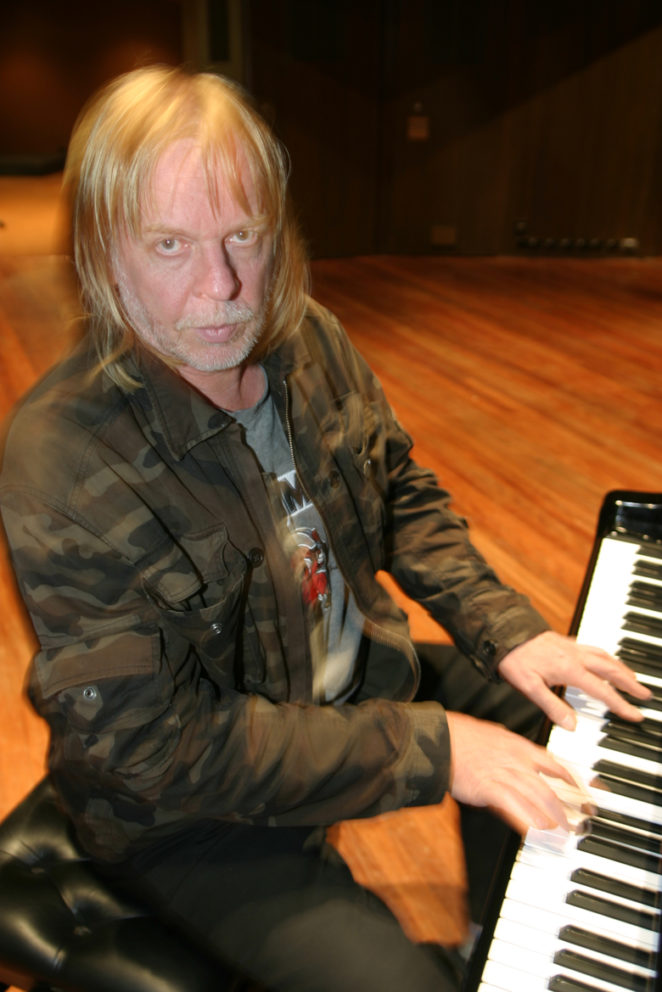 RW: Again a lovely lovely man. I did quite a few things with him like ‘Get it On’. The funniest thing I did with Marc was when he had a little argument with his record company. Quite a big one actually. Anyway he did this thing just to annoy his record company. Actually an Australian band did the same thing. Spectrum released an album as the Indelible Murtceps, which was Spectrum spelled backwards. It was a great album which they released on another label. I bought that one too, it was great. Anyway, he said we’re going into the studio. We did this track and the name of the band was called Dib Cochran and the Earwigs. Only 500 copies pressed but he did it just to annoy his record company. I think one went at auction for five grand. Marc was a great character and loved musicians. He got some bad press after he died and didn’t deserve it. I went quite mad at some of the articles which said he was difficult to work with and a nasty person. I knew him extremely well and that was so not true. What I will say is that he didn’t suffer fools gladly and it was interesting to see that the people who had a moan were the people who either shouldn’t have been in the business, or people who were a bit funny or had a gripe.
RW: Again a lovely lovely man. I did quite a few things with him like ‘Get it On’. The funniest thing I did with Marc was when he had a little argument with his record company. Quite a big one actually. Anyway he did this thing just to annoy his record company. Actually an Australian band did the same thing. Spectrum released an album as the Indelible Murtceps, which was Spectrum spelled backwards. It was a great album which they released on another label. I bought that one too, it was great. Anyway, he said we’re going into the studio. We did this track and the name of the band was called Dib Cochran and the Earwigs. Only 500 copies pressed but he did it just to annoy his record company. I think one went at auction for five grand. Marc was a great character and loved musicians. He got some bad press after he died and didn’t deserve it. I went quite mad at some of the articles which said he was difficult to work with and a nasty person. I knew him extremely well and that was so not true. What I will say is that he didn’t suffer fools gladly and it was interesting to see that the people who had a moan were the people who either shouldn’t have been in the business, or people who were a bit funny or had a gripe.
GP: You also worked with Black Sabbath…
RW: Wonderful time! I did ‘Sabbath Bloody Sabbath’. The funny thing is my second eldest boy Adam plays with Black Sabbath now. It’s the original line-up with Adam on keyboards. Adam was born the year after I did that album. So he’s actually now playing a couple of tracks off ‘Sabbath Bloody Sabbath’ which I played. It’s so weird that your son is playing bits that you played before he was even born. I nearly joined the band at one stage but at that time keyboards were considered not to be a part of heavy metal, and they thought the fans wouldn’t get it. I did ‘Osmosis’ with Ozzy, it’s almost prog rock. I went to see them last year.
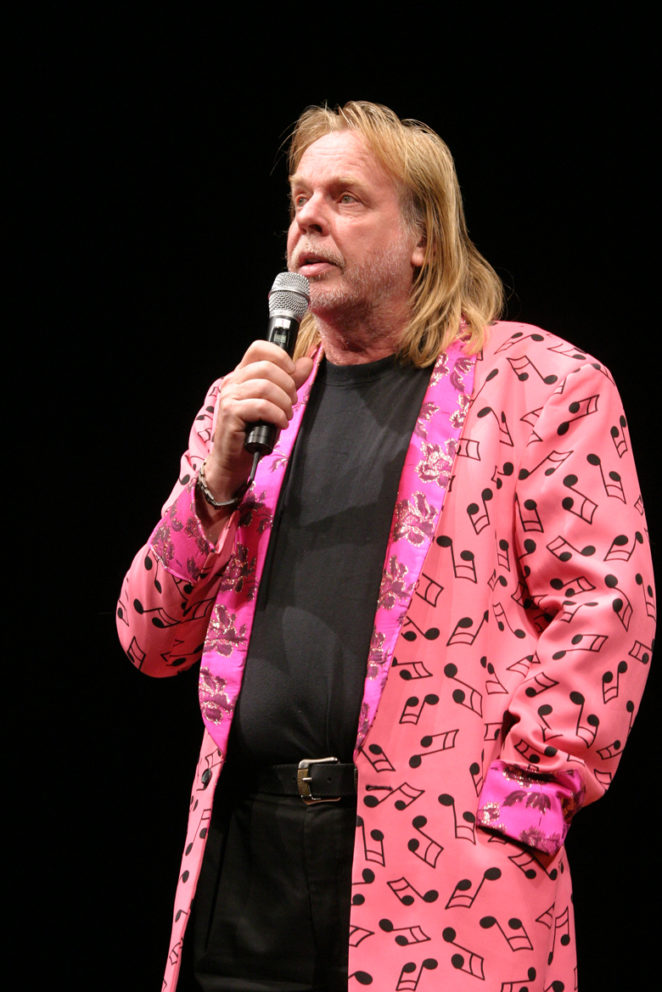 GP: I was talking to Yes bassist Chris Squire a while back about the ‘Topographic Oceans’ sessions with the hay bails and mechanical cows. Is there one Yes moment that you just shake your head in disbelief at?
GP: I was talking to Yes bassist Chris Squire a while back about the ‘Topographic Oceans’ sessions with the hay bails and mechanical cows. Is there one Yes moment that you just shake your head in disbelief at?
RW: We had a motorised cow in the studio that time. My keyboards were actually on hay bails and it’s the first time that two of the keyboards had to go back because one of them had an infestation of worms. The other one had some sort of beetle in it that nobody had ever seen or heard of before. I remember trying to be reasonably serious during a Mellotron part and I’m looking at a full size cardboard model of a cow with an electric udder that swung back and forth. Every now and then the tail would spray up, and here I am trying to play a Mellotron piece on part of thing based on the Shastric Scriptures and I thought … I’m going off to have a drink. It was nuts.
GP: Whose idea was it?
RW: Well there’s five in the band but only four that vote because Allan sits on the fence all the time. I love Allan to death but he can”t make a decision to save his life. He doesn’t want to upset anybody so he will always go… I thoroughly agree with you but on the other hand! So we had a vote on whether to record in the country or city and Allan said ‘I’d love to record in the country but I’d equally like to record in the city’. So we came across this compromise where we would record in the city but try to make it look like the country. So we left it with one of the road crew. I arrived early one morning at the studio and they had a bar there to have breakfast which I did… a large scotch. The manager Monty said to me are you all on the same planet, we had a delivery last night. I said we do have a lot of gear. He said no I think you should look at this. So I went in and there was white picket fencing, chicken coops, hay bails, a cardboard cow and it did look like a farm yard, so I went back and had another scotch.
GP: The punk rock era made it difficult for acts like Yes to be heard. How do you look back on that era now?
RW: It was inevitable that it was going to happen, it was just later coming into Britain than I thought. To be honest I thought that American punk was far better than British punk because American punk had a lot more content. It depends how far you want to go with the word punk. I mean bands like The Clash which you might say come out of punk, was a very good band. I was responsible in the early seventies for discovering The Tubes. I just loved The Tubes and got them signed to A &M and became great friends. So the punk thing was always going to happen. The only thing that disappointed me was that punk was ultra raw and didn’t have the content of someone like The Tubes. I wouldn’t say (punk) it killed a lot of bands, but it put them on hold until it all settled down. The interesting thing about music is that if something really new comes along, what it will really fight against, is what it comes in from. For example when prog rock bands came in, they hurt the pop bands. When the pop bands came in they hurt the crooners. When prog rock bands hurt the pop bands, the crooners started to come back. But interestingly enough, there is always somewhere in the world you can play. In the 80s prog rock was still huge in South America so we went there. You are sadly a commodity, so you have to take that commodity where it is wanted.
GP: Do you look at young keyboard players today and think they have it easy because of all the presets they have?
RW: There are some good young players around now and good bands like Muse and Mars Volta, Tool. There’s no shortage of good players and bands. The only thing I say is that … I get sent a lot of stuff from keyboard players. I can put a CD on and tell immediately what they are using. That’s a Korg Triton patch number 22. Not that there’s anything wrong with that, but I think sometimes they should think that every other keyboard player is using the same patch, so there’s a lot of music that sounds the same. The first thing I always do is basically wipe out the presets and put in my own. It takes weeks to do but then you are an individual. I suppose I was lucky being brought up when there were no presets. You spent ten minutes trying to get a squeak out of it.
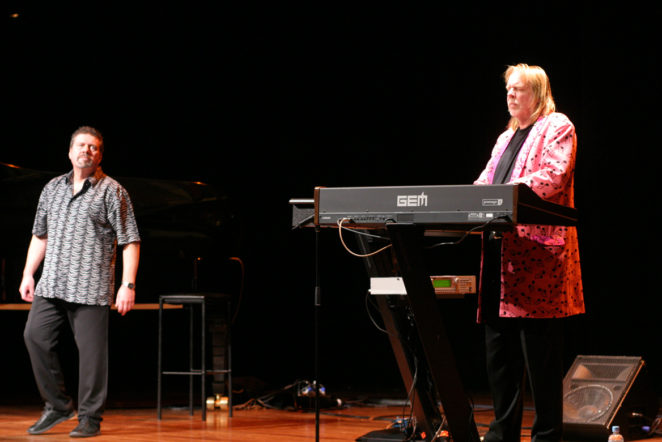
GP: A lot of those presets you invented…
RW: I did invent a lot of the presets. The ones I use on stage… they want me to put on disc but I won’t do it. What’s the point. But in the old days if you got a squeak out of the keyboard, you made a note of it. I was speaking to Keith Emerson and asking whether we would have been lazy if we had been born in this era where you get 3,000 sounds, or would we do what we do now which is find some new individual sounds. To be honest I think if I was born into this era I would be as lazy as everyone else, it’s just that we couldn’t be in those days. In a lot of ways, it’s very similar to cameras. I can buy a camera now and fart around for ten minutes and get a good picture and know I will because I can bloody well see it.
RW: What lengths did you go to to get sounds?
GP: Huge lengths. The first moogs I had were notorious for not being able to get a sound out of. You had to tune between the octaves as well. The most important thing was just to get the whole keyboard in tune, then you tried to find what key it was in because invariably it would never be a key in tune with everything else. In The Strawbs days, there was a track called the ‘Shepherd’s Song’. I used a modular moog.The band was playing in B minor and I was in A flat minor. That was the best you could do. I was speaking with a guy called Mike Vickers who owned the instrument that I borrowed to do it. I said “I’ve got this instrument in tune but can’t get it into concert pitch, what should I do?” He said “you’ve got the keyboard in tune? All the octaves?” I said yes. He said then “just play in whatever key it is. Can you leave it like that. Have you really got it in tune?” That’s how it was.
GP: What was the typical set up in those days?
RW: It changed every six months but the mini moog, which I still use, the Melltron, Fender Rhodes. RMI came out with a nice electric piano, a Wurlitzer, grand piano, Hammond organ. Most instruments that made one sound until polyphony appeared and then the Prophet 5 came out. It wasn’t until the 80s when Korg took the bull by the horns and said we’re going to make an instrument that you can take on the road that won’t fall apart, and don’t have to have people meddling with for four hours before you start. In 1980 Katoh, the boss of Korg decided that musicians should be able to take keyboards on the road. That was the major change in the early 80s.
GP: You fiddled with manufacturing yourself with the Birotron?
RW: The Birotron was a clever machine. To cut a long story short, the Mellotron could play a note for about 8 seconds but then cleared because the tapes fell out the back, it was a nightmare. Light years ahead of its time but it was a pig, no other word for it. We all put up with it because it played great sounds. Dave Biro came up with a similar machine but worked off 8-track tapes meaning the possibilities were enormous and I shoved a fortune into the development for this instrument, and we got other people involved in research and development. We set up a factory in England and three months prior … some bastard invented the ‘chip’ and we were dead and buried. The order book disappeared over night. There were 8 made and I know of four in existence. Tangerine Dream had two. There is one in a Japanese museum and there was one that went for auction for about $20,000. I wish I had one because they did have a very different sound. I used it on the ‘Tormato’ album.
GP: Did you ever use a Fairlight?
RW: I did use one. I used it on an album with Kevin Peek in the 80s and did it all on Fairlight. The problem was that … we were in Perth and it broke down. Fairlight based was in Sydney and it was difficult to get parts. We lost so many days with the crashes. When it worked, it was remarkable, light years ahead of its time and unbelievably expensive.
GP: You didn’t set fire to the Fairlight as you did to some of your old Mellotrons?
RW: Yes I did set fire to my Mellotrons but I wish I hadn’t because there was one recently that a guy sold on e-bay for an absolute fortune. So there won’t be anymore bonfires of instruments, I’m sure.
GP: You kindly did a report on the Moog Fest in New York exclusively for Australian Musician magazine last year. You must have all been glad you played Moog Fest considering Bob Moog’s recent passing?
RW: It was wonderful. I’m glad it was done for obvious reasons. It was Bob’s 70th and it hadn’t been done before. It was a real tear-jerker to be in that club. There were so many different kinds of musicians and to see the amount of music that the instrument has touched from jazz to classical. There isn’t one genre of music that Bob Moog didn’t touch.
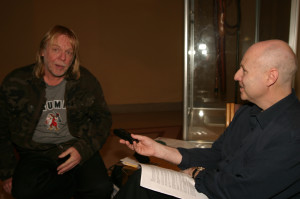 GP: What will you have on stage for this tour?
GP: What will you have on stage for this tour?
RW: Grand piano and two keyboards, GEM Pro Mega. I just love that machine. I don’t normally advise people what to buy but if you want to buy one keyboard to handle a multitude of things, then Pro Mega reminds me so much of a 21st century Korg Triton which is really three instruments in one. And I will have a Triton bank. Korg always produce instruments that are multi-useful. They’re amazing. I actually had the pleasure a couple of years ago at the Frankfurt Music Messe… I was on the General Music stand. I heard that Bob (Moog) was in town. I went to see Bob, then I went around to see Katoh-san the Korg boss, who was in his seventies then. He asked through his translator what I was doing and I told him I had just been to see Bob Moog. He said the “man who started everything.” I said do you know him, ever met him? He hadn’t and I said, would you like to meet him? So I went to see Bob and told him I had been with Katoh-san and Bob said ‘wonderful man’, what he has done with Korg is fantastic. Then Bob said I’d like to meet him. So I said he wants to meet you. Bob said really, why does he want to meet me? Bob you really don’t get it do you? Bob said are you sure he wants to see me? So I put the two together. It was quite a proud moment for me. They hugged each other. I mean if they weren’t both men they would have married there on the spot. That was a real memory. They were like two little boys and went our for lunch.
GP: So this is your final tour, what sort of solo projects will you involve yourself with now?
RW: I keep turning down TV and film music because I’m always on tour. There are all these things that are musically challenging but I can never do them. I have averaged 150 shows in the last five years, 304 nights a year in hotels which is nuts.
So now I will be able to do all of those things.
Since you’re here, check out the exclusive report that Rick personally did for Australian Musician on the wonderful Bob Moog 50th anniversary in New York in 2004. It was also Rick’s 55th birthday. See it HERE

